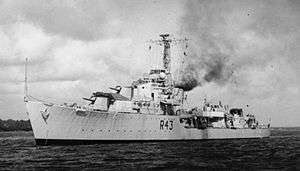HMS Comus (R43)
For other ships with the same name, see HMS Comus.
 HMS Comus, 28 June 1946 | |
| History | |
|---|---|
| Name: | HMS Comus |
| Builder: | Yarrow, Scotstoun |
| Laid down: | 21 August 1943 |
| Launched: | 14 March 1945 |
| Commissioned: | 8 July 1946 |
| Homeport: | Portsmouth |
| Identification: | Pennant number: R43 (later D20) |
| Fate: | Scrapped |
| Status: | Arrived for breaking up on 12 November 1958 |
| General characteristics | |
| Class and type: | C-class destroyer |
| Displacement: |
|
| Length: | 362.75 ft (110.57 m) o/a |
| Beam: | 35.75 ft (10.90 m) |
| Draught: | 11.75 ft (3.58 m) |
| Propulsion: |
|
| Speed: | 36 knots (67 km/h) / 32 knots (59 km/h) full |
| Range: |
|
| Complement: | 186 |
| Sensors and processing systems: | Radar Type 275 fire control on director Mk.VI |
| Armament: |
|
HMS Comus was a C-class destroyer of the Royal Navy, built by Yarrow at Scotstoun. She was launched on 24 August 1943 and commissioned on 20 December 1946.
Operational service
Comus served in the Far East between 1947 and 1957 as part of the 8th Destroyer Squadron.[1] In 1955 she was engaged in the bombardment of Communist forces as part of the Malayan Emergency.[2]
Decommissioning and disposal
Comus was withdrawn from active service and listed for disposal in 1955. Following her sale Comus arrived at the breakers yard of John Cashmore Ltd for scrapping at Newport, Wales on 12 November 1958.
References
Publications
- Colledge, J. J.; Warlow, Ben (2006) [1969]. Ships of the Royal Navy: The Complete Record of all Fighting Ships of the Royal Navy (Rev. ed.). London: Chatham Publishing. ISBN 978-1-86176-281-8. OCLC 67375475.
- Marriott, Leo (1989). Royal Navy Destroyers Since 1945. Ian Allen Ltd. ISBN 0-7110-1817-0.
- Raven, Alan; Roberts, John (1978). War Built Destroyers O to Z Classes. London: Bivouac Books. ISBN 0-85680-010-4.
- Whitley, M. J. (1988). Destroyers of World War 2. Annapolis, Maryland: Naval Institute Press. ISBN 0-87021-326-1.
This article is issued from Wikipedia - version of the 10/11/2015. The text is available under the Creative Commons Attribution/Share Alike but additional terms may apply for the media files.